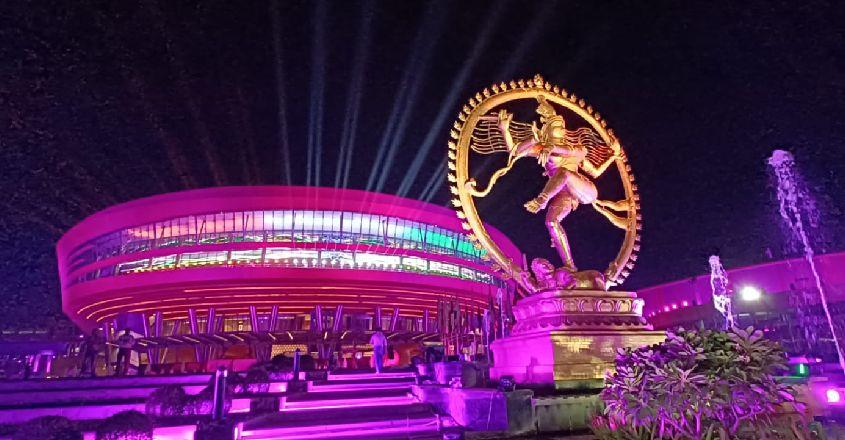By S A H RIZVI
The Times Kuwait, New Delhi Bureau
As New Delhi braces to host the 18th Heads of State and Government Summit of the Group of 20 (G20) . the capital city has been bedecked with a riot of festoons, banners placards and posters to showcase the rich cultural heritage and diversity of this great nation.
From the airport to the venue and areas all around it is looking like a jewel so tastefully everything kas been put in places to give the G20 summit its unique look. To ensure smooth flow of delegates and participants heavy traffic regulation has been laced and three-day holiday has been declared.
The newly built Bharat Mandapam, the International Exhibition-cum-Convention Centre (IECC) at New Delhi’s Pragati Maidan will host the event. It was earlier inaugurated by Prime Minister Narendra Modi in July.
Spread across 123 acres of campus area, the complex is built at a cost of around ₹2,700 crore. It has the state-of-the-art facilities including convention centre, exhibition halls, interpreter room, amphitheatre, making it the country’s largest meetings, incentives, conferences, and exhibitions destination.
The 18th G20 Summit, in which the heads of states and governments will meet, on September 9 and 10. Over 25 world leaders along with other delegates are going to attend this mega event.
The Leaders’ Summit is the climax of the G20 process, and the work carried out over the year through Ministerial Meetings, Working Groups, and Engagement Groups.
The Indian Presidency will also spotlight Lifestyle for Environment (LiFE), with an emphasis on environmentally sustainable and responsible choices at both the individual lifestyle and the national development level, with the aim of achieving a cleaner, greener, and bluer future. The Working Groups will focus on the following tracks: agriculture, anti-corruption, culture, digital economy, disaster risk reduction, development, education, employment, environment and climate sustainability, energy transitions, health, trade and investment, and tourism.
The G20 is expected to adopt a Leaders’ Declaration at the conclusion of the Summit that states Leaders’ commitment towards the priorities discussed and agreed upon during the Ministerial and Working Group Meetings.
One of the largest multilateral summits, the G20 Summit presents a significant diplomatic opportunity for India, which will convene with the adoption of join declaration by all the member states.
India assumed the G20 Presidency on December 1 last year. The 18th G20 Summit in New Delhi scheduled to be held on September 9-10 will be a culmination of all the G20 processes and meetings held throughout the year.
The Group of Twenty (G20) comprises 19 countries – Argentina, Australia, Brazil, Canada, China, France, Germany, India, Indonesia, Italy, Japan, South Korea, Mexico, Russia, Saudi Arabia, South Africa, Türkiye, United Kingdom and the United States and the European Union. The G20 members represent around 85% of the global GDP, over 75% of the global trade, and about two-thirds of the world population.
World leaders from several countries and institutions will mark their presence at the event. They include US President Joe Biden, UK Prime Minister Rishi Sunak, Australian Prime Minister Anthony Albanese, Canadian Prime Minister Justin Trudeau and French President Emmanuel Macron.
At every summit, the host country invites countries and institutions that are not the member of the G20. This year, India has invited Bangladesh Prime Minister Sheikh Hasina, Egypt President Abdel Fattah El Sisi, Netherlands Prime Minister Mark Rutte, Mauritius Prime Minister Pravind Kumar Jugnauth, Nigerian President Bola Ahmed Tinubu, Singaporean Prime Minister Lee Hsien Loong, Spanish President Pedro Sanchez, UAE President Sheikh Mohamed Bin Zayed and Oman Deputy Prime Minister Sayyid Asad Bin Tariq Al Said.
India’s presidency of the summit holds significance as it aims to become a voice for ‘less developed’ global South in a world dominated by developed nations of the West. It is also likely to take up the issue of border tension with China. India, in its part, may attempt to straighten out its diplomatic intricacies with the West after they faced challenges due to Russia-Ukraine conflict.
China had objected the use of the theme Vasudhaiva Kutumbakam saying Sanskrit is not a recognised language under the UN charter but New Delhi soft-pedalled the objection saying its commitment for the world as one family has no other overtone but its heritage.

